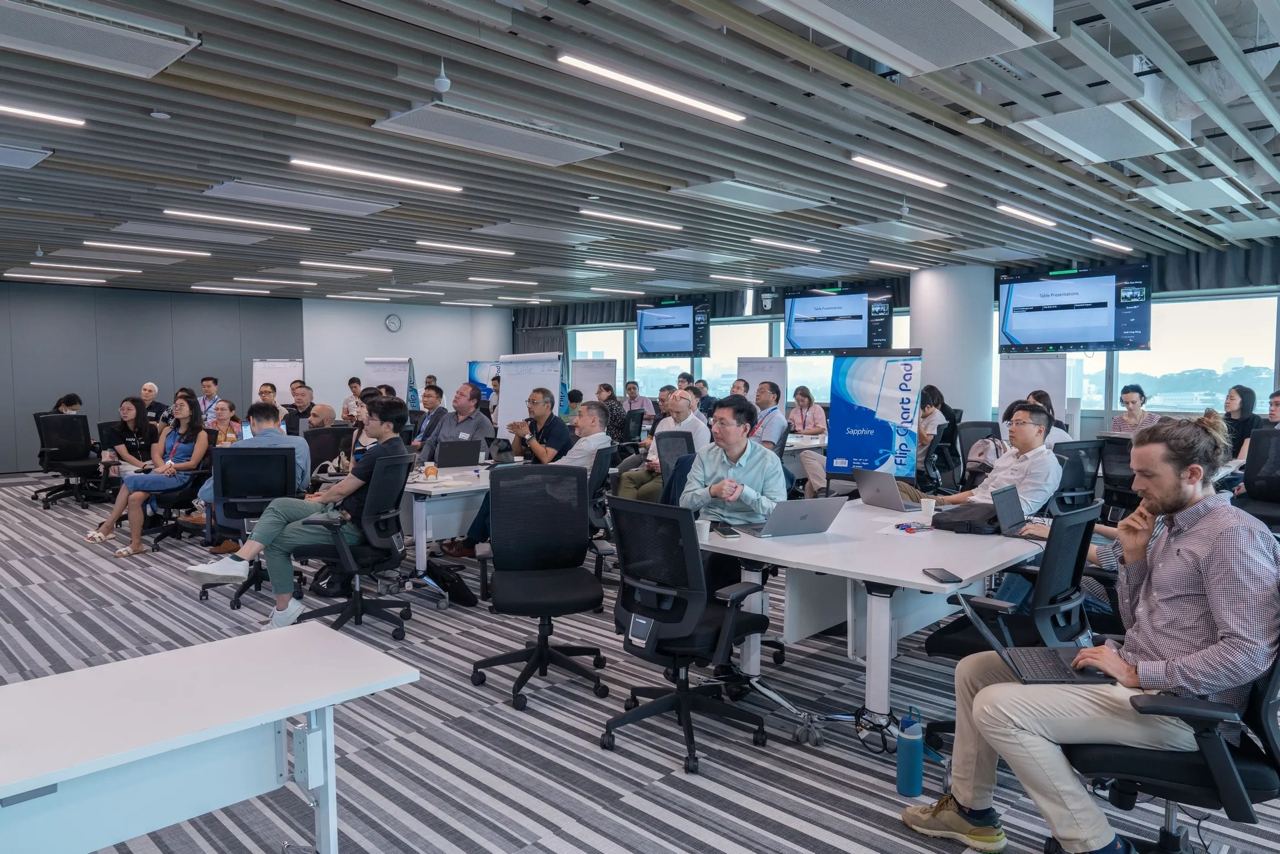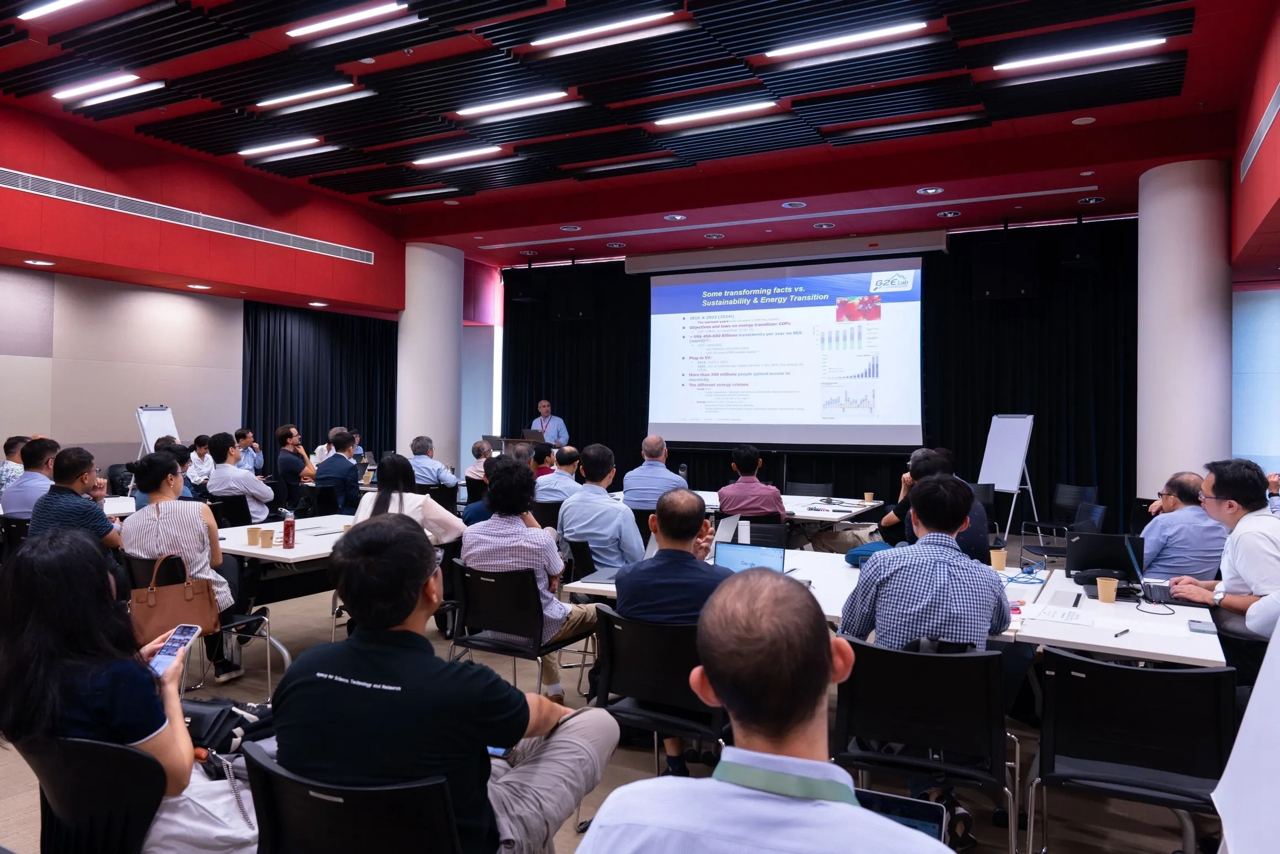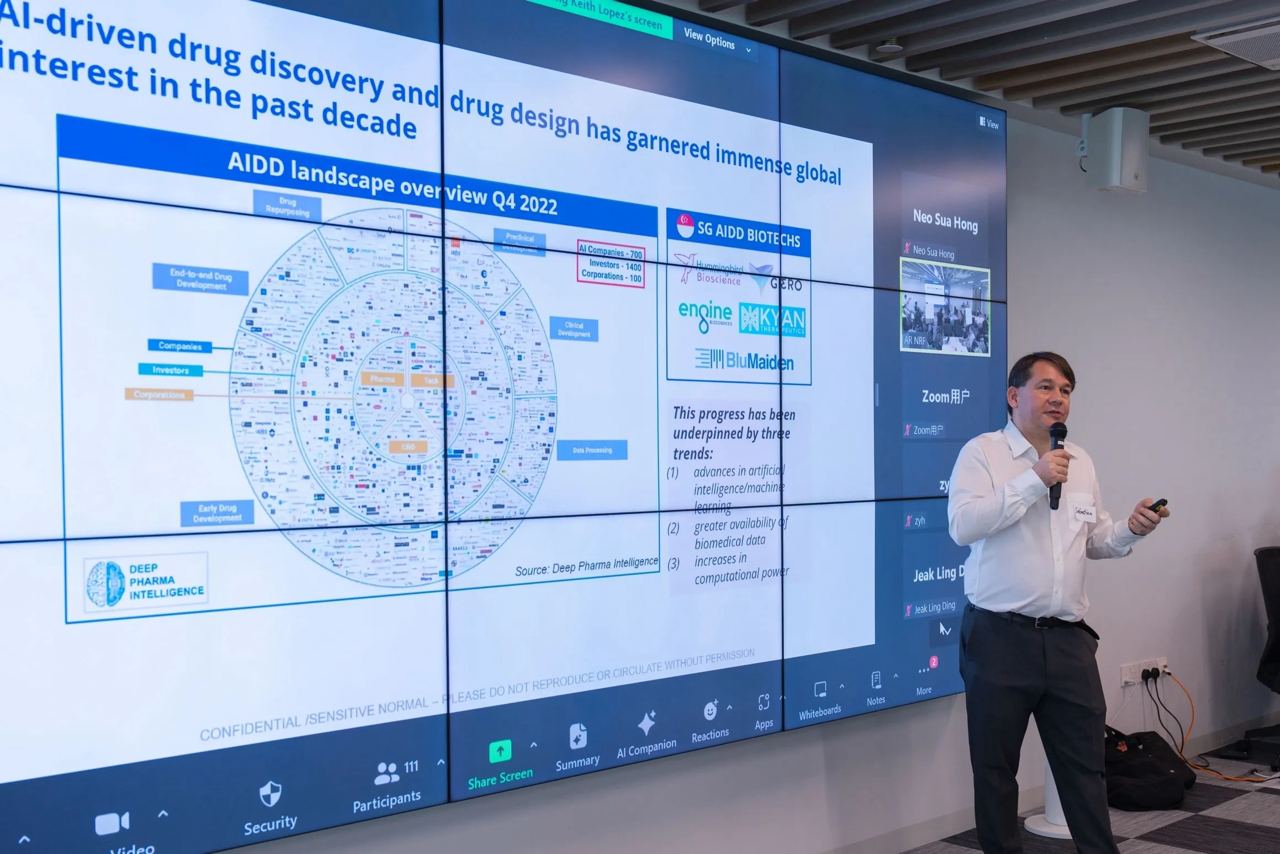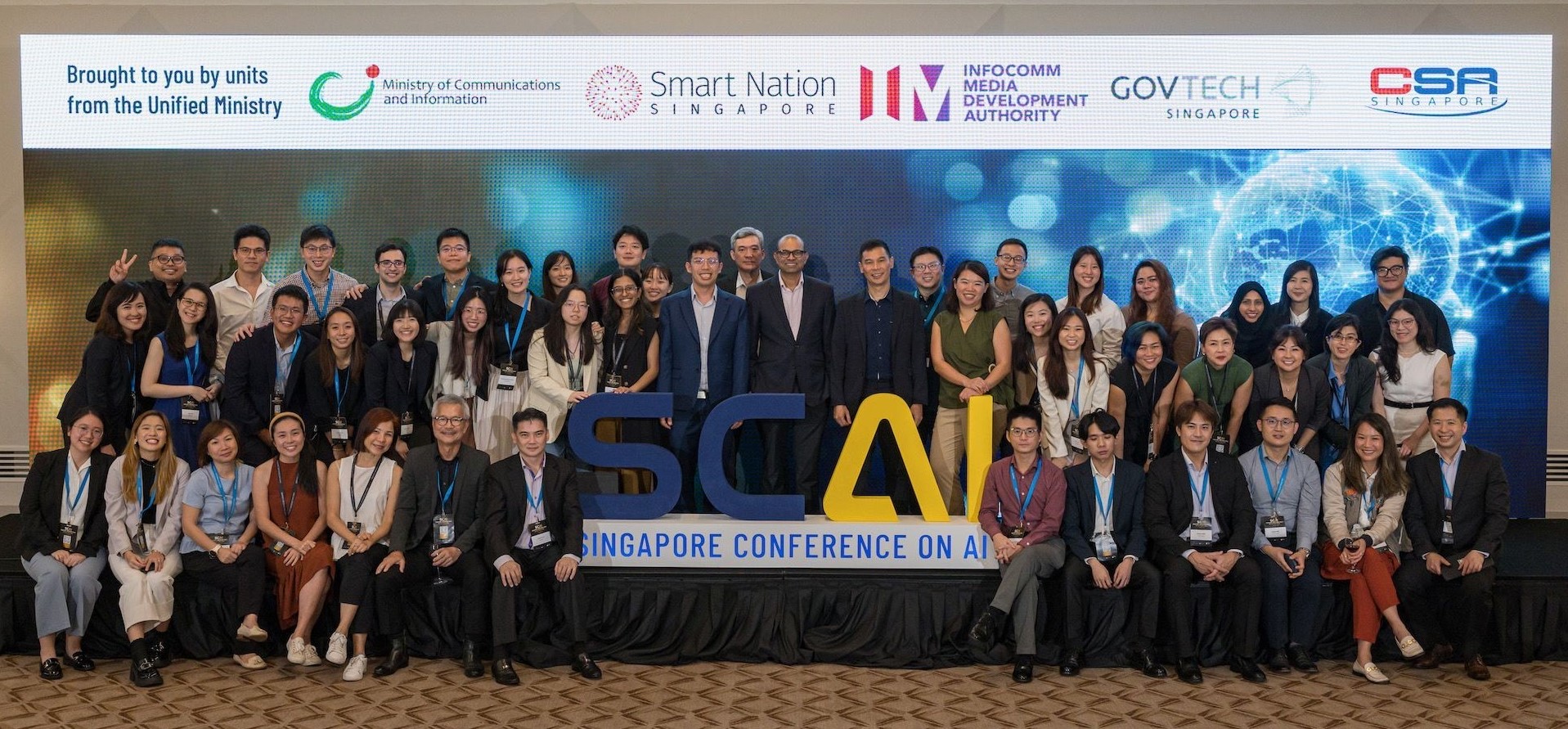Powering Up AI Research in Singapore
ETHOS Issue 27, January 2025

Artificial Intelligence (AI) has emerged as a gamechanger—both as a distinct and significant field to be researched, and as a powerful catalyst for revolutionising the general research process and accelerating the pace of innovation across different disciplines and industries.
With the National AI Strategy 2.0 (NAIS 2.0) as a foundational roadmap, Singapore is poised to accelerate AI research in several ways:

FUNDAMENTAL RESEARCH ON AI
Fundamental research is about deepening our understanding of the science of AI and AI systems. Today, Singapore is a leading global producer of quality research in AI and related fields.1
The 2021–2022 National Research Foundation (NRF)’s Foundational Research Capability (FRC) report on AI, serves as a key reference for Singapore's research priorities in this field. Specifically, we need to prioritise fundamental research in Responsible AI, Resource-efficient AI and Reasoning AI.
Responsible AI
With AI becoming more powerful and accessible, researchers, producers and users need to work closely together to ensure its responsible development and deployment. There are global concerns over safety and security, including potential malicious attacks on AI models, which could have serious consequences in vital areas such as transportation and medical support. Current AI models, including large language models (LLMs), are also black boxes. A lack of transparency about how they make decisions can breed distrust, particularly for safety-critical applications like medical diagnoses and autonomous systems.
Resource-Efficient AI
Current AI research is resource intensive. Some experts contend that the training process for a single large language deep learning model like OpenAI’s GPT-4 or Google’s PaLM could generate approximately 300 tons of CO2 emissions. To put this into perspective, the average individual typically produces around 5 tons of CO2 a year. Reducing the growing reliance on data, compute and other limited resources while still achieving performance gains will be an important priority as AI use increases.
Reasoning AI
While AI is advanced in many areas, humans still excel when novel situations arise. Hence, we need to continue harnessing the synergy between AI and human intelligence and explore how humans and AI agents can collaborate to achieve desirable objectives, especially as AI becomes increasingly integrated into our daily lives.
AI FOR SCIENCE
Singapore also invests in AI for Science–the use of AI to accelerate research productivity in scientific domains and advance scientific research and discovery.2 This is distinct from other efforts to study or advance AI as a science and technology (‘Science of AI’), or to apply AI in addressing practical challenges across different sectors (‘Applied AI’).
The Singapore AI for Science Initiative encompasses a range of programmes, projects, and collaborations to promote and facilitate deep collaborations between AI experts and top scientists in other fields. The areas outlined on the following page are some examples of our interests. In the lead up to the AI4Science and Nobel Turing Challenge Initiative Conference in July 2024, NRF organised workshops,3 such as AI for Biomedical Sciences and AI for Sustainability, to ignite thinking and collaboration among researchers. The July 2024 Conference was a significant milestone and opportunity to take stock of current achievements and shape future research plans on harnessing the potential of AI to revolutionise the scientific discovery process.4




Biomedical and Health Sciences
Less than 0.1% of known proteins and RNA structures have been fully studied. AI-driven methods are essential for accelerating research into how these important biological building blocks are structured and function. This knowledge will facilitate drug development, among other benefits.
In the expansive field of health and medicine, AI can also be used to improve healthcare outcomes by analysing extensive biological and medical data, unlocking new insights, enhancing diagnostic accuracy, and enabling personalised treatments.
Advanced Materials and Sustainability
AI offers solutions to the challenges of complexity and variability in material science. It can be used to model intricate systems, and to enhance and expedite material design, synthesis and testing, paving the way for more sustainable manufacturing technologies. In the realm of quantum materials, AI holds promise for uncovering hidden patterns in data through unsupervised learning, speeding up the discovery of new material properties.
Natural Sciences
Across a range of natural sciences, AI is revolutionising research by streamlining research processes, optimising experiments, analysing vast, complex datasets, and uncovering hidden patterns. Through multi-physics and multi-scale modelling, AI is also transforming simulations and enhancing their accuracy in many fields.
APPLIED AI RESEARCH
Applied research is about leveraging AI to address real-world challenges in Singapore, in key sectors such as education and healthcare. We have made notable progress in some of our applied AI projects. The following are just some examples of our efforts to date. For the next bound, we aim to do more to create transformative AI applications.
Mother Tongue Learning
AI is being used to enhance Mother Language (MTL) homebased learning for primary school students, with platforms such as Language Automated Evaluation by Generating Answers/Questions from Cartoons (LEARN)5 and SingaKids Pic2Speak.6 Currently, students mainly rely on textbooks for learning. In future, they could benefit from personalised and interactive learning experiences through play. Teachers could then monitor students’ performance and progress digitally, reducing their administrative workload and freeing them to focus on other pedagogical tasks.
Monitoring Health
In 2018, the “AI in Health Grand Challenge” was held to encourage innovative approaches to use AI to enhance primary care in health promotion and disease management.
JARVIS-DHL (JARVIS-Diabetes, Hypertension and hyperLipidemia) is an applied project that emerged from the Grand Challenge. It uses AI to provide predictive care and personalised treatments for three common chronic conditions, empowering patients through better education and self-care.7 EMPOWER+ is one mobile application that has been developed as part of the JARVIS-DHL project. Initial studies show the app effectively improves glycaemic control and is well-received by both patients and health professionals.
DEVELOPING OUR RESEARCH ECOSYSTEM
Be it with industry, AI researchers abroad or our local AI community, innovation happens when people come together to collaborate and leverage the power of AI to solve complex problems. AI is not ‘just a technology’. It is a glue that can bind many communities together, connecting people across disciplines, industries, and borders in the pursuit of excellence and empowerment.
In 2017, the national programme AI Singapore (AISG) was established to bring together all Singapore-based research institutions, as well as the ecosystem of AI start-ups and companies, to anchor deep national capabilities in artificial intelligence. AISG is supported by the National Research Foundation’s Research, Innovation and Enterprise (RIE) 2020 and 2025 Plan. Aside from research programmes, AISG has developed technology and innovation programmes to foster innovation.
AISG’s Technology Programme, for instance, has played a significant role in paving the way for Challenges. These are outcome-focused initiatives, typically conducted over several weeks or months, aimed at mobilising researchers locally and globally to tackle important problem statements faced by Singapore and the world.
Examples of Challenges
In 2021, AISG organised the Trusted Media Challenge, inviting teams to develop AI that could help discern between real and fake media.
More recently, AISG organised an Online Safety Prize Challenge to solicit models for detecting harmful multilingual and Singaporean-centric online memes involving social biases. For this Grand Challenge, no datasets were provided for model training and development. This was to simulate the thorny real-world task of building models with little or no relevant data (or in low-resource environments).
Currently, AISG is working with the Cybersecurity Research Programme Office (CRPO) on a Safe and Secure LLMs Global Challenge, inviting teams from around the world to develop robust security measures to mitigate attacks on Large Language Models (LLMs).
On the industry front, AISG’s 100 Experiments (100E) surfaces innovative solutions to industry AI challenges.8
Examples of 100E Success Stories
In 2019, Sompo Holdings (Asia) enrolled in the 100E program to enhance fraud detection capabilities using AI. Working with AISG’s AI Engineers and Apprentices, they crafted a machine-learning model within seven months that boasts a 90% increase in detection rates, ensuring full coverage against fraud. Customers now receive claim payouts in mere minutes, while Sompo anticipates annual cost savings of $200,000 to $300,000 after three years.
In another project with IBM to enhance product quality, a model was developed to automatically classify product risk levels, eliminating the previously manual task. The model can achieve accuracy levels of over 90%, while reducing the time required from one week to just one hour.
Beyond the initiatives by AI Singapore, MDDI’s National AI Group continues to drive new initiatives such as the Singapore Conference for AI to create a vibrant ecosystem.
The SCAI Experiment
Singapore needs to continuously attract bright minds around the world to work with our research community. Recognising the global nature of AI challenges, we gathered a diverse group of experts,9 spanning across academia, government and industry, for the Singapore Conference on AI (SCAI). Instead of focusing on solutions, as is the conventional approach, SCAI sought to identify the most critical problems in AI development and deployment.

Instead of a typical conference format, with pre-determined presentations and panels, the conference was designed around articulating questions—on issues ranging from combating disinformation to encouraging equitable outcomes with AI—to stimulate emergent discussions and perspectives.
Twelve SCAI Questions were conceptualised and written by SCAI delegates over the three days of conference, tackling core issues such as reliable, trustworthy and AI governance structures.10 Beyond the Questions, the SCAI delegates also served as an invaluable resource for Singapore’s growing AI ecosystem and brain trust.
The National AI Group continues to be bold, agile and innovative in finding ways to uplift Singapore’s AI research ecosystem, and to actively bring communities together—so that everyone can benefit from the latest global advancements and breakthroughs in AI.
Growing Our Research Network
We continue to do more to attract top AI talent to contribute to Singapore’s AI journey, and to seed local research initiatives while allowing Singapore-based AI experts to engage with other researchers both locally and internationally. Our goal is to cultivate a robust AI talent ecosystem that drives innovation, fosters collaboration, and positions the nation as a global leader in AI excellence. In March 2024, we announced the AI Visiting Professorship to attract leading researchers for collaboration with Singapore. This initiative is designed to drive research in alignment with our national AI agenda, while catalysing additional research activities in Singapore.
We have partnered with Singaporean talents based abroad, such as Dr Koh Pang Wei, an award-winning AI researcher who is currently based in the University of Washington. By leveraging the expertise of such internationally based researchers, Singapore effectively broadens its networks and enriches its AI ecosystem. In addition to attracting current AI talent, we are also nurturing and developing the stars of tomorrow. Supported by Nanyang Technological University and AISG, the Singapore teams won two out of four gold medals for the scientific round of the inaugural International Olympiad in AI, which featured more than 40 teams from around the world. Through workshops and joint initiatives, Singapore continues to build a dynamic and globally connected AI community, fostering an environment where local researchers can stay at the forefront of AI advancements and the brightest minds can converge to drive the nation’s AI ambitions forward.
As Singapore’s AI and research ecosystem move into their next phase, we can look forward to many more exciting initiatives. Stay tuned for more announcements on the National AI R&D Plan!
NOTES
- Singapore’s research field weighted citation impact ranks at #1 globally for 2018 to 2021. This means that the works of Singapore researchers are cited more times compared to the average number of citations received by other similar publications. Singapore also ranks among the top 10 countries worldwide in terms of Natural Language Processing and Computer Vision publications in leading AI conferences by the same metrics.
- Unlike conventional machine learning, scientific applications demand meticulous data.
- https://file.go.gov.sg/ai4scscopingreport.pdf
- https://ai4science.sg/ai4sci%2Fntci-conf
- https://aisingapore.org/learn-language-automated-evaluation-by-generating-answers-questions-from-cartoon
- https://aisingapore.org/singakids-pic2speak-multilingual-ai-tutor-uplifting-singapores-bilingual-edge/
- https://connect.aisingapore.org/2020/09/ask-jarvis-the-personalised-ai-agent-for-dhl-care/
- https://aisingapore.org/innovation/100e/
- https://scai.gov.sg/community/
- https://www.scai.gov.sg/scai-questions/

